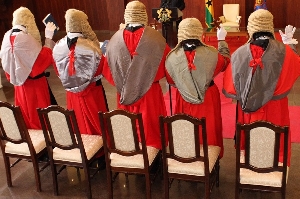By Kwame Okoampa-Ahoofe, Jr., Ph.D.
Garden City, New York
May 9, 2015
E-mail: okoampaahoofe@optimum.net
Theoretically speaking, Mr. Gabriel Otchere-Darko may be absolutely right that in the short term, paying more for power generation may drastically reduce the current regime of erratic power supply (See "Gabby Proposes 'Smart' Dumsor Solution to Mahama" MyJoyOnline.com / Ghanaweb.com 5/9/15). In reality, that is only one-half of the problem. The real problem is chronic inefficiency in the form of the formula by which the government budgets for energy production and supply in the country. Then also, our wasteful culture and attitude towards the use of both electricity and water resources ought to be promptly curbed.
Even more sgnificantly, the government may need to partner with established energy suppliers with proven record of efficiency in the advanced countries, such as Consolidated Edison (Con-Edison), of the United States. There are others in Britain, France, Germany, Canada, Australia and elsewhere whose acumen and expertise could be brought to bear on the country's rag-tag energy supply system. The short-term power-supply strategizing may not be wholly out of place; but unfortunately, what we have here is a chronic problem that requires a comprehensive and long-term approach, in terms of both efficiency and anticipation of output even as the country's population exponentially increases and its industrial development equally inches up as well.
Our civil service culture also needs to become more disciplined, in terms of work habits and attitudes towards state-owned property, including the use of electricity in government buildings and other facilities. And this may not seem relevant, but the current regime of executive double-dipping whereby full-time parliamentarians are also culled from the legislature to serve as full-time cabinet appointees, is criminally wasteful for a woefully under-developed country like Ghana that requires the full occupational diligence and commitment to ensure the sound and rapid development of the country. Advanced countries Britain are able to practice this double-dipping system of governance because they have already developed a relatively far more efficient system of doing so over the course of generations. Ghanaians, on the other hand, are still on the lower rungs of democratic governance, and our level of accountability, both in terms of personal work ethics and the institutional monitoring of the same, still leaves much to much to be desired.
And then also, in view of the apparently gross misapplication of our oil revenue, why doesn't the government work out a formula with some of the oil-mining companies so that our share of crude-oil harvests goes directly into the operation of the various thermal power stations dotted acrosss the country? I also partly agree with Mr. Otchere-Darko on the need for the country to definitively wean itself of its rather retrograde addiction to IMF-World Bank bailout programs. And also, instead of dumping most of the economic burden on the ordinary worker, the number of cabinet appointees and their deputies ought to be drastically reduced to synch with the size of public revenue. As well, the percentage of government appointees to civil-service jobs ought to be appreciably reduced to ensure efficiency; and also, the number of members allowed to sit on the various boards of public corporations, even non-salaried board appointees.
The provision of breakfasts, lunches and dinners for these board appointees does significantly add up over the course of time. And you know what? This commonsense approach to administrative culture is largely the same kind of prescription admonished, and administered, by global lending institutions like the IMF and the World Bank. And so, really, all this hullabaloo over the need for an IMF-World bailout is much ado about absolutely nothing!
______________________________________________________________
Opinions of Saturday, 27 June 2015
Columnist: Okoampa-Ahoofe, Kwame














